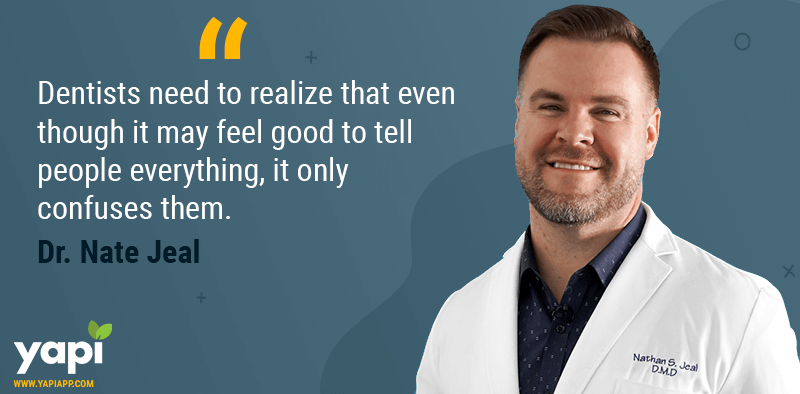
Here’s a maybe not-so-popular secret: much of what is taught in dental school needs to be relearned in the real world. As a new(er) dentist, you may think that building a solid reputation as a dentist means knocking your patients’ socks off with your dental knowledge and explanation of treatments. Or perhaps you are committed to pleasing patients at all costs. While being patient-centric and focusing on patient education are important, how new dentists approach these, and other aspects of practice management can significantly affect their growth and reputation.
We sat down with Dr. Nathan Jeal, a multiple practice owner with more than a decade of experience, to get his take on what prevents startup practices (and their owners) from reaching their potential. He is also a co-founder of Fast Growth Practice, a program that helps dentists grow their practices.
Mistake: Thinking that patients want to understand the “how,” not the “why” of their treatment.
Through my coaching experience, I realized that dental school cultivates this broad misunderstanding around patient education and informed consent. Dentists are taught that patient education means telling everyone how you’re going to solve a problem—that’s not what it should be about. Our patients don’t need to know the gory details of a technical procedure.
Dentists need to realize that even though it may feel good to tell people everything, it only confuses them. When people are confused, that prevents them from making a decision and potentially pursuing a treatment. We tell dentists that the more they listen and the less they talk, the greater the patient’s ability to decide.
Dentistry: More than a 9 to 5

Often, dentists adopt this label of “dentist” and think that means they go into a practice Monday through Friday and deal with people’s teeth. But dentistry can be so much more than that if you choose to look beyond what’s in front of you right now.
………………………
Want to learn more about growth in dentistry and beyond? Check out our e-guide, “Practice Management Advice from 6 Established Dentists.”
Mistake: Believing the customer is right no matter what.
There was a time when I would get a negative review, and I’d feel bad about it. Now, I view those reviews (not that we get them very often) as an opportunity to respond to customers. Sometimes we were wrong, and sometimes the patient was wrong. However, I know that we always try to perform an excellent service with the patient’s needs in mind. So if there’s something that goes wrong, it’s usually because patients had unfair expectations or they are just not pleasant to work with.
This change in perspective has changed the degree of happiness I experience in dentistry. If you go to work thinking that your customer is always right but know in your heart they are not, that’s a miserable way to run a practice.
Mistake: Being inconsistent with marketing efforts.
The biggest mistake that novice marketers or business owners make is they think they can throw a hundred dollars or a thousand dollars at a marketing effort and be done. Then when they don’t see millions in their bank account two weeks later, they throw up their hands and give up.
My number one tip is to stick with it; marketing is all about compounding effects. You need momentum and visibility, and people need to see, hear, and experience your message multiple times before they decide to book an appointment. Marketing also requires coordination across many different mediums. For example, we do a $100,000 a day campaign for clients through our Fast Growth Practice business; this program includes a coordinated multimedia campaign across email, social media, broadcast, radio, and print. All those efforts are focused on new patient acquisition on a single day during a very defined period. And we find that kind of approach works well.
Mistake: Letting ‘soft’ skill development fall to the wayside.
Dentists typically focus a lot of their time and money on clinical development, often at the expense of developing their “soft” skills. And while clinical skills are essential, I think investing in your communication capabilities is probably the most valuable thing that doctors can do, whether they’re new or more experienced. Being able to guide your patients and give them the right information at the right time to make decisions is crucial.
Furthermore, those soft skills can help you perform those clinical tasks better and improve patient interactions. Look to people with good soft skills in dentistry or other industries and incorporate those insights into your work.
***
Want a deeper dive into practice management advice? Download our e-guide, “Practice Management Advice from 6 Established Dentists,” to get more insights from industry experts.




